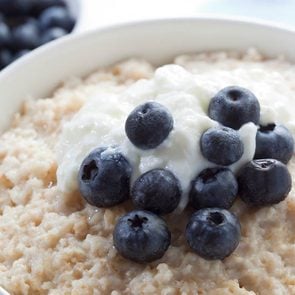Are Blueberries Good for You? Their Nutrition, Calories, and Benefits
Updated: Jul. 29, 2023
The all-purpose fruit is a nutritional powerhouse rich in antioxidants. Here's what to know about blueberries' nutrition, including the health benefits, calories, and more.
Blueberries: An all-purpose fruit
Eating oatmeal wouldn’t be the same without sweet-tasting blueberries sprinkled on top. The same goes for a berry smoothie, which just begs to be added in with that banana. And what would life be like without a healthy blueberry muffin to go with your tea?
Blueberries have long been a staple fruit, but they’re rising in popularity. Since 2008, the United States has doubled its blueberry production, producing more than 700 million pounds in 2019, according to the International Blueberry Organization.
These little berries aren’t just delicious, they’re loaded with essential nutrients making them one of the healthiest foods you can eat.
Here’s what you need to know about blueberries’ nutrition, benefits, and fun ways to eat them.
What are blueberries?
Blueberries, a member of the heather family (Vaccinium spp), have been around for 13,000 years, according to the U.S. Highbush Blueberry Council. And we’ve been eating them in the U.S. for about 100 years. In North America, blueberries are harvested from April through September in 38 states, including California, Florida, Georgia, Michigan, Oregon, and Washington. Off season, you can still buy them in grocery stores, as they’re imported from South America.
Highbush blueberries are the most common. But there are other blueberry plants, including lowbush, hybrid half-high, and rabbiteye, according to The Old Farmer’s Almanac. Blueberries are grown on bushes, but you can also plant them at home in a garden or in a container. Top Hat, Pink Lemonade, and Pink Champagne are a few yummy varieties. Wild blueberries (lowbush), which are a tinier berry, grow in certain states, like Maine, but are more readily available frozen.
Blueberry nutrition facts
Blueberries are loaded with vitamins and minerals like vitamin K1 (good for bone health), vitamin C (skin health and immune function), and manganese, which helps with the metabolism of amino acids, lipids, proteins, and carbs. Blueberries are also low in calories and a good source of fiber. Here are the nutrition facts for one cup (148 g) of blueberries:
Calories: 84
Fiber: 3.5 g (13% DV)
Protein: 1 g (2% DV)
Fat: 0.5 g (1% DV)
Carbs: 21 g (8% DV)
Sugars: 15 g
Potassium: 114 mg (3% DV)
Vitamin C: 14 mg (24% DV)

Are blueberries good for you?
When it comes to this super fruit, there’s no shortage of blueberry health benefits, according to science and our panel of experts. Its nutrient-rich profile provides a lot of health advantages.
Blueberries are rich in antioxidants
There’s a reason why these sweet little gems have a reputation as a disease-fighter. “Blueberries contain compounds called anthocyanins, which give them their distinctive blue color,” says Whitney Linsenmeyer, RD, spokesperson for the Academy of Nutrition and Dietetics and assistant professor of nutrition at Saint Louis University in Missouri. “The anthocyanins have been studied for their effects in reducing the risk of cardiovascular disease, cancer, and age-related cognitive decline.” (Here are the best antioxidant-rich foods.)
Blueberries may boost brain health
Blueberries play a key role in the MIND diet, a diet that’s been shown to reduce the risk of Alzheimer’s disease, according to a study in Alzheimer’s & Dementia.
“Current research suggests that diets rich in anthocyanins, as well as other flavonoids, can enhance memory and help prevent age-related cognitive decline,” Lisenmeyer says.
One randomized, double-blind, placebo-controlled trial, published in the European Journal of Nutrition in 2018 found that older adults who ate the equivalent of one cup of fresh blueberries per day scored better on cognitive tests compared to a placebo. (Here’s how to make blueberries and other superfoods healthier.)
Blueberries may help with weight management
Eating anthocyanin-rich foods like blueberries may help prevent weight gain as you age, suggests a study published in 2016 in BMJ. While the effects are small, the study authors point out that even preventing slight amounts of weight gain can lead to better blood pressure control and reduce the risk of heart disease. (These are the best fruits for weight loss.)
In addition to the anthocyanins, blueberries pack only 84 calories per cup and are rich in fiber. “Dietary fiber may help contribute to feelings of satiety or fullness and therefore support weight management,” says Mia Syn, RDN, a registered dietitian nutritionist in Charleston, South Carolina. (Here are more benefits of fiber.)
Blueberries promote heart health
It’s not just maintaining a healthy weight that can keep your ticker in shape. The antioxidants in blueberries have also been shown to strengthen heart health. In a study published in 2019 in The American Journal of Clinical Nutrition, participants with metabolic syndrome who ate one cup of blueberries a day improved the health of their blood vessels and arteries. The researchers estimate the effects would reduce heart disease risk by up to 15 percent.
Blueberries provide immune support
A cup of blueberries offers a good source of vitamin C. “Vitamin C helps the immune system work properly and is an antioxidant that helps protect cells from damage caused by free radicals,” says Syn. Luckily, both fresh and frozen blueberries are easy to find in winter, during cold and flu season. (These are the best frozen fruits and vegetables to buy.)
Risks and side effects
Unless advised by your doctor, there’s no reason to avoid blueberries. In fact, as the authors of a review of studies published in 2020 in Advances in Nutrition concluded, “It is widely agreed that the regular consumption of tasty, ripe blueberries can be unconditionally recommended.”
One note of caution: A blueberry allergy exists, but it’s extremely rare.
Best way to eat blueberries
Not only are blueberries yummy on their own, they’re easy to bake with and incorporate into savory foods.
“Blueberries are highly nutritious fresh or frozen,” Lisenmeyer says. In the summer, look to see if there’s a “U Pick” around your area and spend a morning blueberry picking. Lisenmeyer recommends then freezing picked berries on a sheet tray in a single layer and storing them in a Ziplock bag for year-round eating. Other delicious ideas:
- Fold fresh blueberries into a savory salad with wild rice, corn, and fresh herbs, suggests Lisenmeyer.
- Add blueberries to your breakfast, in smoothies, oatmeal, and yogurts, says Syn.
- Toss blueberries with just a bit of sugar (let them sit until juicy) and serve over lemon curd for dessert, suggests Lisenmeyer.
- Use blueberries as a natural sugar substitute
- Cook over the stove with lemon zest and chia seeds until they develop a jam-like texture, says Lisenmeyer. (Then spread on everything.)























